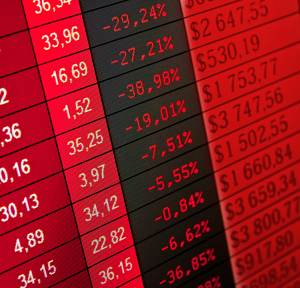Investment Strategies
Netflix's Share Price Horror Show Spooks Major Investor

Intensifying competition, pressures caused by rising costs of living and a desire perhaps to get away from television after lockdowns have conspired to hammer Netflix's stock price. One prominent investment house has run out of patience. The saga is a reminder of how volatile certain stocks can be.
The stunning share price fall of about 44 per cent in Big Tech
and media darling Netflix, hit by concerns that
subscribers are switching off as cost-of-living increases bite
and with people keen to get outdoors after the pandemic, is
a timely reminder of how fast markets can turn.
US-based Pershing
Square Holdings has unloaded its Netflix stake which it
bought earlier in 2022, explaining that its loss on that
investment had cut year-to-date returns by four percentage
points. Pershing Square funds are down by about 2 per cent since
the start of 2022, it said in a statement.
When Covid-19 struck and lockdowns forced people to stay at home,
subscriptions to the US-based streaming news service surged. The
rise of these media platforms has been one of the most potent
forces in the media and entertainment world in the past decade,
putting established broadcasters and cinema businesses under
pressure. However, the end of lockdowns in certain countries,
plus concerns that householders are cutting back to pay for
essential items as inflation rises, have hit Netflix hard.
The firm has reported losing 200,000 subscribers in its first
quarter, well short of its forecast of adding 2.5 million
subscribers. Suspending service in Russia after the Ukraine
invasion took a toll, resulted in the loss of 700,000 members
(Reuters, 19 April, others).
“While we have a high regard for Netflix’s management and the
remarkable company they have built, in light of the enormous
operating leverage inherent in the company’s business model,
changes in the company’s future subscriber growth can have an
outsized impact on our estimate of intrinsic value. In our
original analysis, we viewed this operating leverage favourably
due to our long-term growth expectations for the company,”
William A Ackman, founder of the renowned activist investment
house, said in a letter emailed to this news service.
“Yesterday, in response to continued disappointing customer
subscriber growth, Netflix announced that it would modify its
subscription-only model to be more aggressive in going after
non-paying customers, and to incorporate advertising, an approach
that management estimates would take 'one to two years’ to
implement. While we believe these business model changes are
sensible, it is extremely difficult to predict their impact on
the company’s long-term subscriber growth, future revenues,
operating margins, and capital intensity,” Ackman
continued.
Ackman’s letter made it clear that he doesn't have the patience
to see the process play out.
“We require a high degree of predictability in the businesses in
which we invest due to the highly concentrated nature of our
portfolio. While Netflix’s business is fundamentally simple to
understand, in light of recent events, we have lost confidence in
our ability to predict the company’s future prospects with a
sufficient degree of certainty. Based on management’s track
record, we would not be surprised to see Netflix continue to be a
highly successful company and an excellent investment from its
current market value. That said, we believe the dispersion of
outcomes has widened to a sufficiently large extent that it is
challenging for the company to meet our requirements for a core
holding,” he added.
According to its website, Pershing Square Holdings Ltd, a listed
closed-end fund registered in Guernsey, logged a 26.9 per cent
return for 2021 across all its investments and a stunning 70.2
per cent result in 2020 – the year of the pandemic.
Mark Crouch, analyst at social investment network eToro, said
Netflix had “shocked” investors this week by revealing a fall in
subscriber numbers for the first time in more than a decade.
“There are a number of reasons for this, but the main two are
arguably the fact that the streaming game has never been more
competitive, with Disney+ and Amazon Prime now established, and a
raft of new services that have just launched or are about to
launch. At the same time, households in the US and Europe,
Netflix’s two most important regions, are struggling with a
once-in-a-generation cost-of-living crisis which has resulted in
belt tightening,” Crouch said.
“Lastly, Netflix believes there are more than 100 million
households sharing accounts, meaning it is losing out on
additional subscribers and revenue. It has been fairly relaxed
about that until now, but is testing out ways to extract more
cash out of them. That may well boost revenue in the short-term,
but in reality to expand its reach to people who do not interact
regularly with Netflix will require the streaming firm to keep
producing the goods when it comes to content,” he said.
Netflix accounts for 4.58 per cent of the market weight of the
MSCI World Media and Entertainment Index, with Alphabet A and C
taking up 23.09 and 22.04 per cent, respectively, in first and
second place. Meta Platforms (the business name of Facebook)
comes third, at 14.52 per cent, according to a 31 March note from
MSCI. Disney is at 6.88 per cent, and Comcast at 5.89 per cent.
For the index as a whole, gross returns over the year to date
are negative, at -13.42 per cent, but positive, at 17.3 per
cent over three years. For much of the past 15 years, the MSCI
World Media and Entertainment Index has outperformed the wider
MSCI World Index of major countries’ equity returns.
A note from Deutsche Bank said that the fall in Netflix’s share
price leaves its price at its lowest level in over four years,
and the company’s year-to-date losses now stand at -62.45 per
cent, making it the worst performer in the entire S&P 500 on
a year-to-date basis.
